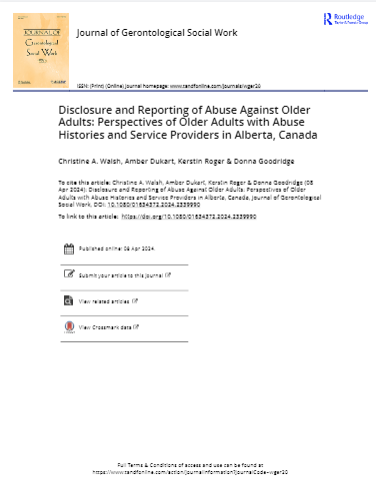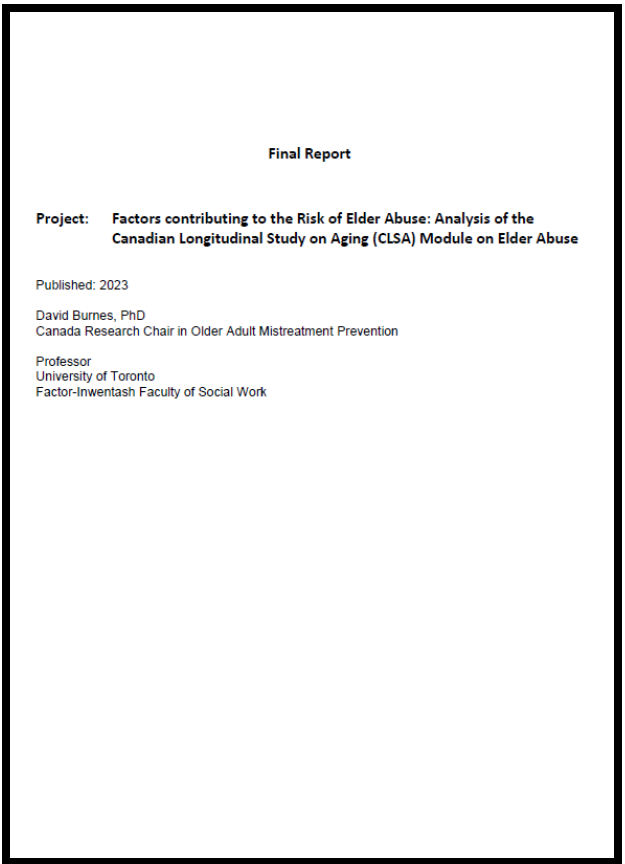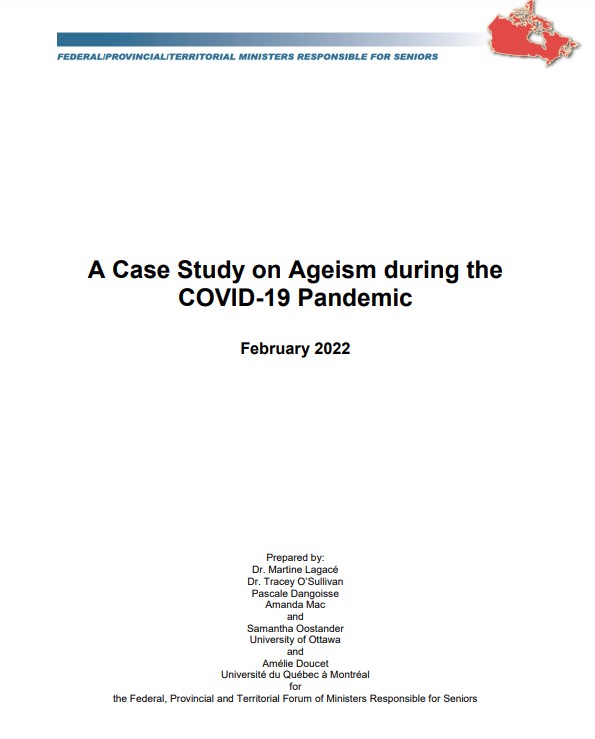Studies
The development of effective elder abuse prevention efforts requires a sound understanding of the risk and protective factors that increase or decrease the likelihood of victimization. The existing literature on elder abuse risk and protective factors is largely based on studies that use convenience sampling or cross-sectional methodological designs that limit our capacity to make valid, causal inferences.
Extending previous research, the current project used data from the Canadian Longitudinal Study on Aging - a population-based cohort study – to identify elder abuse risk and protective factors. This study used baseline (2015) characteristics or changes in characteristics over a three-year period to predict the prevalence and severity of elder abuse at follow-up (2018). Predictor variables spanned several domains of potential risk or protection (physical, cognitive, psycho-emotional, childhood experience, home living, social support, and socio-demographic) to understand the likelihood of overall elder abuse and separate subtypes (emotional abuse, physical abuse, financial abuse).
Findings from the CLSA indicate that elder abuse is widespread: one out of every ten older adults reports experiencing some type of elder abuse each year. This finding may under-estimate the true population prevalence of elder abuse due to known under-reporting on the topic, as well as the incomplete scope of sub-types covered in the project. The CLSA assessed three of the five commonly recognized sub-types: emotional, physical and financial abuse.
Abuse against older people often targets those most vulnerable: older adults living with or developing vulnerabilities over time related to physical health, functional capacity, cognitive capacity, and/or mental health are more likely to report elder abuse. On the other hand, various forms of social support serve to protect older adults from elder abuse, including engagement with in-person or online social networks. Findings also point to a life course component of abuse and violence: respondents who reported experiences of childhood maltreatment were also more likely to report elder abuse in older adult adulthood.
Given the prevalence of elder abuse among older adults in the general population, the development of effective prevention interventions is urgently required, and findings from the current project can help inform such efforts.
Published: 2023
David Burnes, PhD Canada Research Chair in Older Adult Mistreatment Prevention
Professor, University of Toronto Factor-Inwentash Faculty of Social Work
 This exploratory qualitative study seeks to understand the barriers and facilitators of disclosure and reporting of abuse against older adults by conducting interviews with older adults with lived experience of abuse and service providers working directly with this population in Alberta, Canada. Thematic analysis revealed three key themes:
This exploratory qualitative study seeks to understand the barriers and facilitators of disclosure and reporting of abuse against older adults by conducting interviews with older adults with lived experience of abuse and service providers working directly with this population in Alberta, Canada. Thematic analysis revealed three key themes:
(1) Barriers to disclosure and reporting of abuse;
(2) Facilitators to disclosure and reporting; and
(3) Key tensions between service providers’ and older adults’ perceptions of the disclosure and reporting process.
Based on these findings, we offer recommendations to increase awareness, promote disclosure, and improve services for older adults experiencing abuse.
Christine A. Walsh, Amber Dukart, Kerstin Roger & Donna Goodridge (08 Apr 2024): Disclosure and Reporting of Abuse Against Older Adults: Perspectives of Older Adults with Abuse Histories and Service Providers in Alberta, Canada, Journal of Gerontological Social Work, DOI: 10.1080/01634372.2024.2339990
Published online: 08 Apr 2024.
Access the article: https://doi.org/10.1080/01634372.2024.2339990
 This book describes and analyzes the lived experience of elder abuse from the queer community. It discusses the experiences by transwomen, gay men and lesbians of financial abuse, physical and sexual abuse, homophobic abuse, and neglect within partner relationships, residential care, in home care, and religious organizations. Queer and trans elders have been described as ‘The Silent Generation’, since they have lived through times when their sexual and gender identities were criminalized and pathologized. The book shows that they are far more at risk to suffer abuse and neglect by those they should be able to trust, since they are more likely to have encountered all key risk factors, such as isolation, previous abuse and trauma, and mistrust of the health care system. Their vulnerability has been overlooked and this book addresses that gap. As such, this book provides a great resource to anyone working with elders, including medical professionals, care providers, police, counsellors, and policy makers:
This book describes and analyzes the lived experience of elder abuse from the queer community. It discusses the experiences by transwomen, gay men and lesbians of financial abuse, physical and sexual abuse, homophobic abuse, and neglect within partner relationships, residential care, in home care, and religious organizations. Queer and trans elders have been described as ‘The Silent Generation’, since they have lived through times when their sexual and gender identities were criminalized and pathologized. The book shows that they are far more at risk to suffer abuse and neglect by those they should be able to trust, since they are more likely to have encountered all key risk factors, such as isolation, previous abuse and trauma, and mistrust of the health care system. Their vulnerability has been overlooked and this book addresses that gap. As such, this book provides a great resource to anyone working with elders, including medical professionals, care providers, police, counsellors, and policy makers:
- Raises awareness of the invisible problem of elder abuse in the LGBTQ2SA+ community
- Expands and complicates our theorizing of elder abuse and encourages further research
- Offers support to other survivors and encouragement for them to share their stories
Authors: Claire Robson, Jen Marchbank, Gloria Gutman, Makaela Prentice
Click on book cover for more information
Edition No: 1
2023 . XVII, 167 p. 2 illus.
Series
International Perspectives on Aging
Hard cover
ISBN 978-3-031-33316-3
A new study by Burnes and colleagues published in Nature Aging, based on data from the Canadian Longitudinal Study on Aging, uses a national, longitudinal, population-based design to advance our understanding of elder mistreatment risk and protective factors beyond the existing cross-sectional research on the topic. The study found that:
- One in ten older adults across Canada experience some form of elder mistreatment each year.
- Older adults who experienced higher levels of childhood maltreatment were more likely to experience elder mistreatment in later life.
- Older adults with greater vulnerability related to physical, cognitive and mental health status and shared living were at higher risk of elder mistreatment.
- Higher levels of social support were protective against elder mistreatment.
- Older adults identifying as Black or reporting financial need were at heightened risk of elder mistreatment.
This longitudinal, population-based study strengthens our understanding of elder mistreatment risk and protective factors across several domains and informs the development of prevention strategies. Access the abstract and article here. (a subscription to Nature Aging or an institution login is required to read the article in full).
- Canadian older adults were particularly impacted by the COVID-19 pandemic, with over 80% of the COVID-19 related deaths during the first wave occurring in long-term care homes. The situation generated substantial media coverage, as well as government communications and academic research
- Understanding how older adults and the aging process were framed during this health crisis is important because the public discourse can have a significant influence on an individual’s personal experience of aging and relationships with older adults. Previous studies have shown that ageist stereotypes and attitudes are often conveyed through public discourse
- The current study aims to understand how older adults and the process of aging were depicted by the Canadian media, academics, older adults (associations of older adults), as well as government representatives themselves through the first and second waves of the COVID-19 pandemic
- There are 2 main questions that guided this work:
- how did ageism emerge as an issue during the COVID-19 pandemic in the media, research, among older adults, associations of older adults and Federal, Provincial and Territorial (FPT) governments’ communications?
- how did the media, researchers, older adults, associations of older adults, and FPT governments contribute to, or address ageist attitudes, behaviours or discourse?
- To answer these questions, researchers conducted a content analysis of Canadian public documents related to COVID-19 and older adults, published from April to December 2020. These public documents included opinion-editorials (authored by journalists or older adults or associations of older adults), academic articles, and government communications (press briefings and communications generated by Federal, Provincial and Territorial ministries and departments)
Source: Federal/Provincial/Territorial Ministers Responsible for Seniors Forum
Page 1 of 8


















